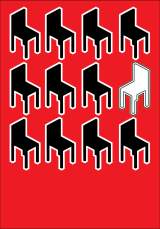 A drama by Reginald Rose | Adapted from the television play by Sherman L. Sergel
A drama by Reginald Rose | Adapted from the television play by Sherman L. Sergel
A 19-year-old boy has just stood trial for the fatal stabbing of his father. It looks like an open-and-shut case-until one of the jurors begins opening the others’ eyes to the facts. During the discussions each juror reveals his or her own character as the various testimonies are re-examined and the murder is re-enacted before their own eyes! Tempers get short, arguments grow heated, and the jurors become twelve angry people. Their final verdict and how they reach it provides an electrifying and thought-provoking experience and will, we hope, keep audiences on the edge of their seats.
Director’s Notes
Twelve Angry Men was penned by Reginald Rose as a television play in 1954. Rose later wrote the screenplay for and co-produced the 1957 movie with actor Henry Fonda, who played Juror number 8. The story was inspired by Rose’s own experience of serving on a jury in a manslaughter trial. Although written before the fruition of the civil rights struggle, the subject matter remains fresh and relevant. Until the 20th century, both Canada and the United States had relatively open immigration policies for European immigrants. As Canada has become increasingly multicultural, the United States has become increasingly restrictive in its immigration policy.
In the play, a young man is on trial for murder. His race is never disclosed, but he is different and certainly an immigrant. The play touches on themes of race, class, prejudice, family and anonymity, as none of the characters’ names are ever revealed. Each juror is representative of class of persons, or backgrounds, races or creeds. No one in America (and Canada) is not represented by at least one of the twelve jurors.
From time to time, a comedian or celebrity will make a racial comment that will spark enormous debate. Such debates are always heated and the criticism acerbic and vitriolic. We take offence easily and give offence freely, secure in the knowledge that we are not prejudiced. “Well, I’m not prejudiced, but…” It is only in the aftermath of such an event that we take the time to look within. Within the context of that self-denial, each character is called upon to face their inner demons as they are confronted by one another during the deliberations.
The concept of Nature vs. Nurture debates the importance of the relative importance of an individual’s innate qualities versus one’s personal experience. Not easily resolvable, it is one of the subjects that forms part of the jury room deliberations you’re watching today.
I hope you enjoy Twelve Angry Jurors as much as we have enjoyed preparing it for you. And remember, we have three more fabulous shows to come: A Midsummer Night’s Dream, Taking Sides and Romantic Comedy.
Tony Rein
Director







